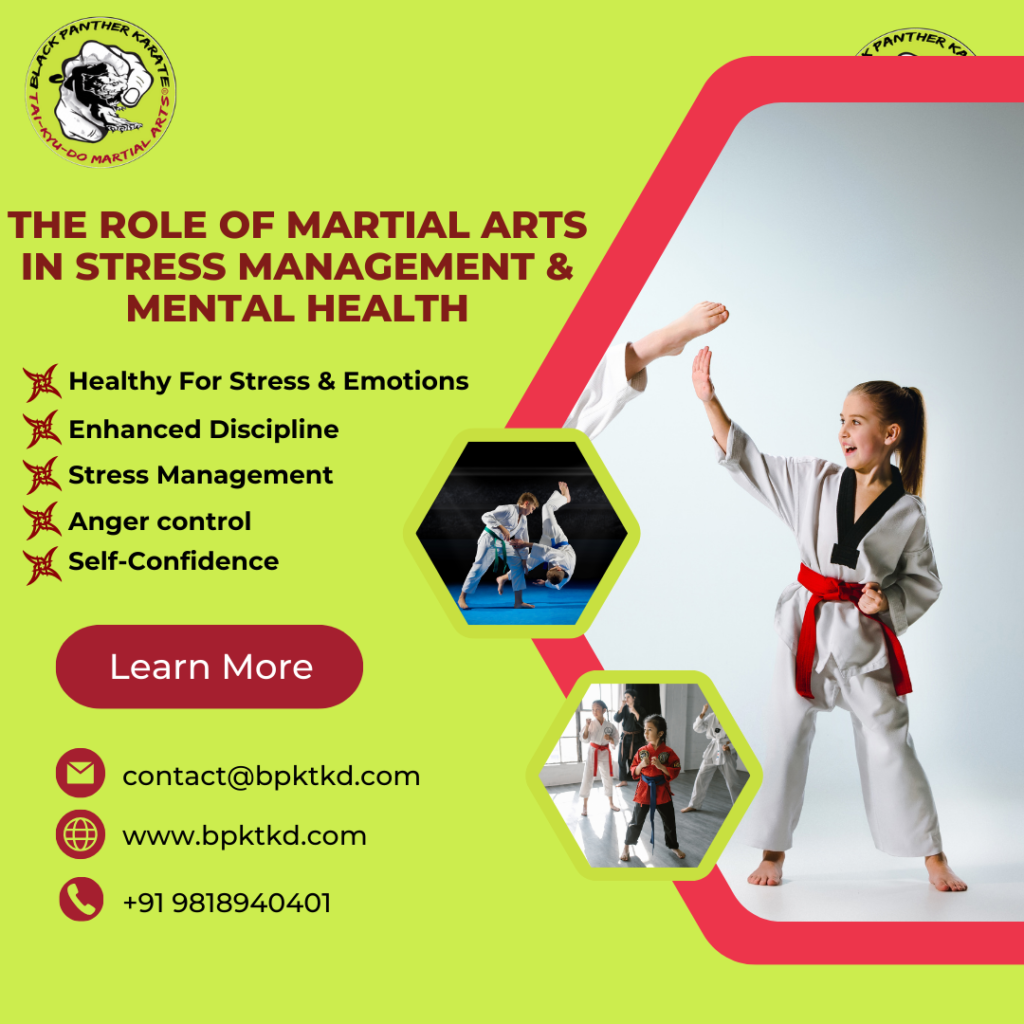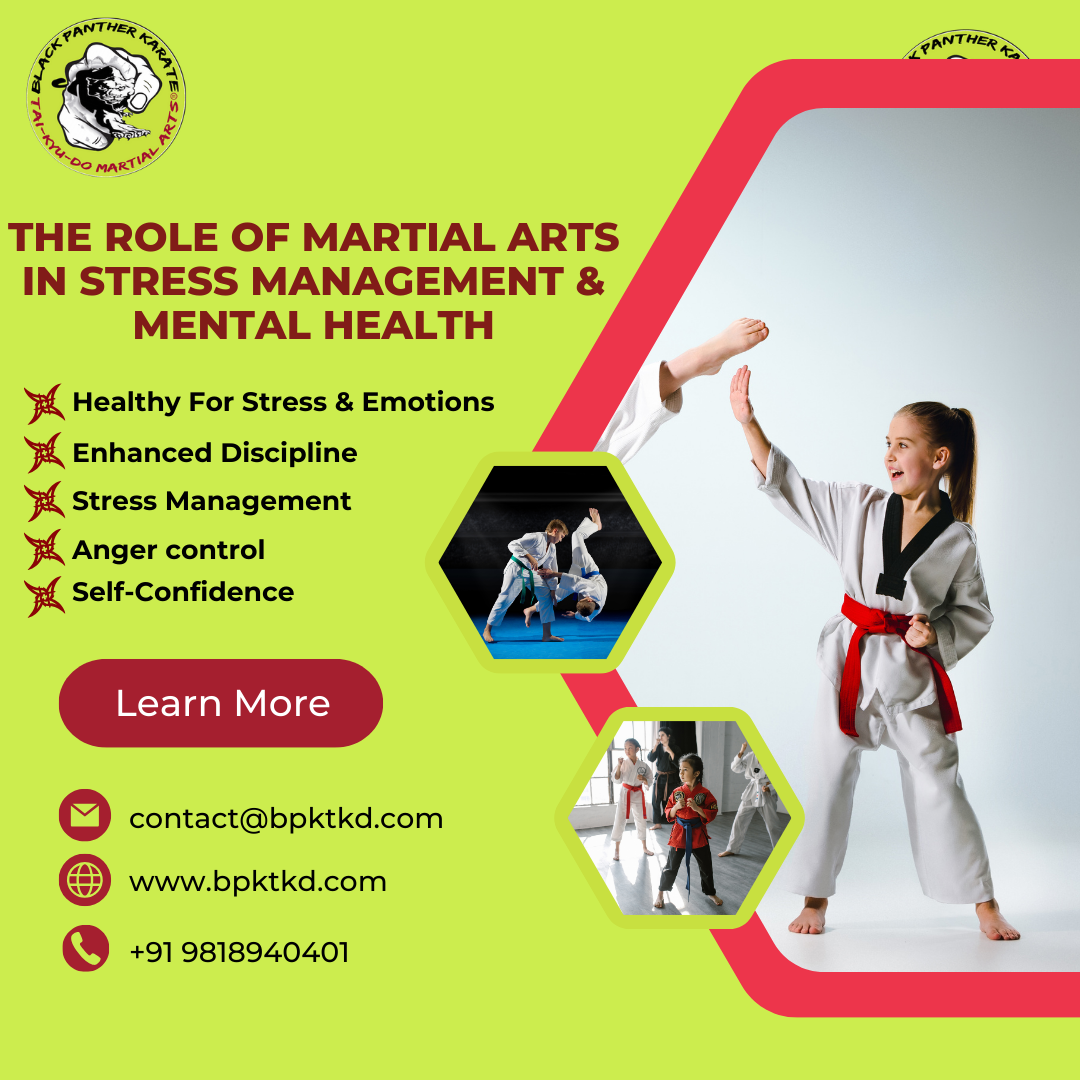
The function of martial arts in mental health and stress reduction
The Role of Martial Arts in Stress Management and Mental Health
Introduction:
Stress and mental health disorders are common problems affecting people of all ages in our fast-paced and demanding world. Martial arts stand out as a potent and comprehensive method among other stress-reduction and mental health techniques. This blog post will examine the significant effects of martial arts on stress reduction and mental health, emphasizing how the discipline—which includes self-defense instruction—can be a life-changing tool for people looking to find resilience and balance.
Physical Activity as a Stress Reliever:
Engaging in regular physical activity is a well-established method for alleviating stress. Martial arts, with its dynamic movements, provides a comprehensive and invigorating form of exercise. The rhythmic flow of techniques, combined with controlled breathing, helps release tension, reduce cortisol levels, and promote the release of endorphins—natural mood enhancers. Keyword Insertion: The incorporation of self-defense training within martial arts amplifies its stress-relieving benefits, offering a practical and purposeful outlet for stress management.
Mind-Body Connection in Martial Arts:
One of the distinctive features of martial arts is the emphasis on the mind-body connection. The practice encourages practitioners to be fully present in the moment, focusing on their movements, breath, and surroundings. This mindfulness aspect of martial arts is a powerful antidote to the stressors of modern life, allowing individuals to momentarily step away from worries and distractions. Keyword Insertion: The mind-body connection nurtured in martial arts, particularly through self-defense training, enhances the effectiveness of stress management techniques.
Stress Reduction through Controlled Breathing:
Controlled breathing is a fundamental aspect of martial arts training. Techniques such as deep diaphragmatic breathing and synchronized breathwork help regulate the autonomic nervous system, shifting the body from the stress-inducing sympathetic mode to the calming parasympathetic mode. This intentional focus on breath fosters relaxation and mental clarity, serving as a valuable tool for stress reduction. Keyword Insertion: The incorporation of controlled breathing techniques during self-defense training in martial arts contributes to a more comprehensive stress reduction experience.
Building Resilience through Challenges:
Martial arts training involves facing challenges and overcoming obstacles, both physical and mental. The gradual progression through belts or ranks, the mastery of techniques, and the perseverance required during training contribute to the development of resilience. This resilience, cultivated through the challenges of martial arts, extends to everyday life, empowering individuals to navigate stressors with a resilient mindset. Keyword Insertion: The challenges presented during self-defense training in martial arts become a practical avenue for building mental resilience and fortitude.
Emotional Release and Catharsis:
Stress often manifests as pent-up emotions and tension within the body. Martial arts provides a constructive outlet for the release of these emotions. Whether through the powerful strikes of striking arts like Muay Thai or the fluid movements of Tai Chi, individuals can channel and release stress in a controlled and purposeful manner, fostering emotional catharsis. Keyword Insertion: Self-defense training in martial arts becomes an emotionally liberating experience, allowing individuals to channel stress into purposeful actions and movements.
Mindfulness Meditation in Motion:
Many martial arts disciplines incorporate elements of mindfulness meditation into their practice. Forms, katas, or specific sequences of movements become a moving meditation, requiring focus, presence, and a meditative state of mind. This mindfulness meditation in motion serves as a meditative reprieve from the hustle and bustle of daily life, promoting mental calmness. Keyword Insertion: The inclusion of self-defense techniques within martial arts forms enhances the meditative aspect, allowing individuals to cultivate mindfulness while honing practical self-defense skills.
Community and Social Support:
The sense of community within martial arts schools can be a crucial factor in stress management. The camaraderie and support of fellow practitioners create a positive and uplifting environment. Social connections and a supportive community contribute to emotional well-being, offering individuals a network of encouragement during challenging times. Keyword Insertion: The communal nature of self-defense training in martial arts fosters social connections, providing a valuable support system for individuals managing stress.
Empowerment and Self-Efficacy:
Martial arts, including self-defense training, instills a sense of empowerment and self-efficacy. Learning practical self-defense skills enhances an individual’s confidence in their ability to protect themselves. This heightened sense of empowerment carries over into various aspects of life, allowing individuals to approach challenges with a greater belief in their capabilities. Keyword Insertion: The empowerment derived from mastering self-defense techniques in martial arts contributes to a positive self-image and increased self-efficacy in managing stress.
Release of Energy and Physical Tension:
Physical tension often accompanies stress, leading to muscle tightness and discomfort. The physicality of martial arts serves as an effective means of releasing pent-up energy and tension. Through strikes, kicks, and controlled movements, individuals can dissipate physical stress, promoting a sense of relaxation and ease. Keyword Insertion: Self-defense training within martial arts becomes a dynamic outlet for the release of physical tension, offering a practical and purposeful means of stress relief.
Holistic Well-being and Long-Term Mental Health Benefits:
The holistic nature of martial arts, encompassing physical, mental, and emotional aspects, contributes to long-term mental health benefits. Regular practice establishes a foundation for overall well-being, fostering a positive mindset, emotional resilience, and effective stress management strategies that extend beyond the dojo. Keyword Insertion: The incorporation of self-defense training within martial arts becomes a cornerstone for holistic well-being, providing individuals with tools for long-term mental health
Conclusion:
Martial arts, with its diverse range of disciplines and practices, stands as a multifaceted tool for stress management and mental health. The incorporation of self-defense training within martial arts amplifies its effectiveness, offering individuals not only a physical outlet for stress but also practical skills for personal safety. As individuals engage in the transformative journey of martial arts, they discover a path to mental resilience, mindfulness, and holistic well-being—a journey that extends far beyond the physical techniques and into the realm of mental and emotional empowerment.

